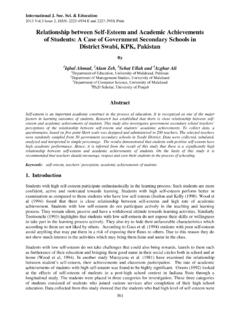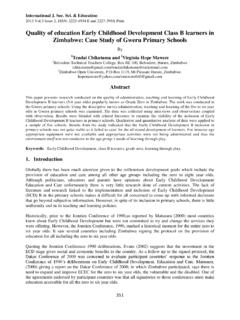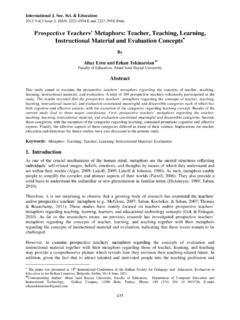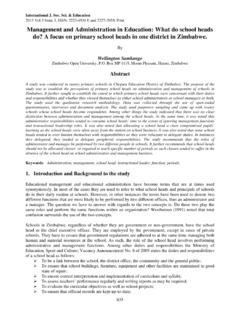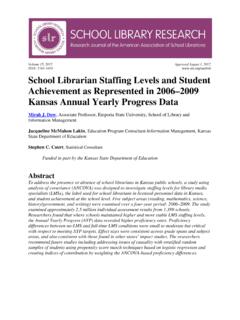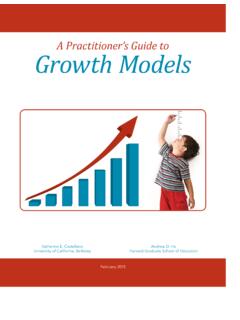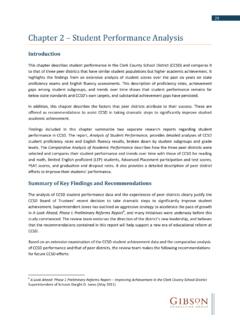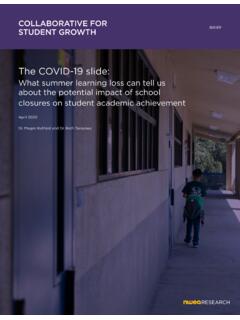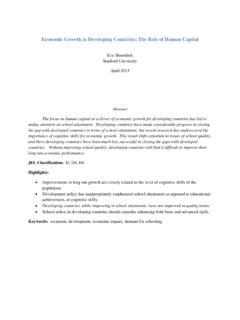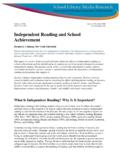Transcription of EFFECTS OF SOCIOECONOMIC STATUS ON STUDENTS …
1 International Journal of Social Sciences and Education Volume: 1 Issue: 2 April 2011 119 Dr Saifullah Saifi , Tariq Mehmood EFFECTS OF SOCIOECONOMIC STATUS ON STUDENTS achievement Dr. Saifullah Saifi Assistant Professor University of Gujrat Tariq Mehmood Principal, Government Centennial Model High School Turbela Township Haripur Introduction SOCIOECONOMIC STATUS (SES) is a combined measure of an individual's or family s economic and social position relative to others, based on income, education, and occupation. When analyzing a family s SES, the mother's and father s education and occupation are examined, as well as combined income, versus with an individual, when their own attributes are assessed (GOP,2008).
2 The article is based on a study, which is an attempt to explore the various factors that have an impact on achievement , depending upon different SOCIOECONOMIC STATUS in the society and how does it effect the academic achievement of STUDENTS . The study also examines the literature that reveals that the SOCIOECONOMIC STATUS of the parents can significantly contribute in the achievement of good grades at colleges. The paper illustrates the impact of income, occupation on educational attainment of STUDENTS . The paper delineates the effect of many SOCIOECONOMIC indicators on individual student achievement .
3 Factors Effecting SOCIOECONOMIC STATUS Income "Income" can be defined invariably as wages, salaries, profits, rents, and any flow of earnings received. However, another way of looking at revenue generation (income) is in the form of workers compensation, social security, pensions, interests or dividends, royalties, trusts, alimony, or other governmental, public, or family financial assistance. Income can be looked at in two terms, relative and absolute. Absolute income, as theorized by economist John Maynard Keynes, is the relationship in which as income increases, so will International Journal of Social Sciences and Education Volume: 1 Issue: 2 April 2011 120 Dr Saifullah Saifi , Tariq Mehmood consumption, but not at the same rate (Economyprofessor, 2008).
4 Relative income dictates a person or family s savings and consumption based on the family s income in relation to others. Income is a commonly used measure of SES because it is relatively easy to figure for most individuals. Income inequality is most commonly measured around the world by the Gini coefficient, where 0 corresponds to perfect equality and 1 means perfect inequality. Economic inequality in the US is on the rise, leaving low income families struggling in society. Low income families focus on meeting immediate needs and do not accumulate wealth that could be passed on to future generations, thus increasing inequality.
5 Families with higher and expendable income can accumulate wealth and focus on meeting immediate needs while being able to consume and enjoy luxuries and weather crises (Boushev, 2005). Education "Educational attainment" corresponds to the SES because it is a cross cutting phenomena for all individuals. An individual s educational attainment is considered to be the bench mark for his over all achievement in life, reflected through his grades or degree. Consequently, education plays a role in income. Education gives impetus and thus increases earnings. As conveyed in the chart, the highest degrees, professional and doctoral degrees, make the highest weekly earnings while those without a high school diploma are financially penalized.
6 Higher levels of education are associated with better economic and psychological outcomes ( : more income, more control, and greater social support and networking). Education plays a pivotal role in honing the skills of an individual that makes him/her a ready person to seek and acquire jobs, as well as specific qualities that stratify people with higher SES from lower SES. Annette Lareau speaks on the idea of concerted cultivation, where middle class parents take an active role in their children s education and development by using controlled organized activities and fostering a sense of entitlement through encouraged discussion.
7 Laureau argues that families with lower income do not participate in this movement, causing their children to have a sense of constraint. A division in education attainment is thus born out of these International Journal of Social Sciences and Education Volume: 1 Issue: 2 April 2011 121 Dr Saifullah Saifi , Tariq Mehmood two differences in child rearing. In theory, lower income families have children who do not succeed to the levels of the middle income children, who feel entitled, are argumentative, and better prepared for adult life (Annette, 2003). Occupation "Occupational prestige" as one of the components of SES, comprises income and educational attainment.
8 Occupational STATUS corresponds to the educational attainment of an individuals through which, obtaining better jobs, exploring and retaining better positions becomes inevitable and thus improvement in the SES. Occupational STATUS consequently becomes an indicator for our social position/ STATUS in the society, hence, describing job characteristics, decision making ability and emotional control, and psychological demands on the job (termed as emotional genius). Occupations are ranked by the Census (among other organizations) and opinion polls from the general population are surveyed.
9 Some of the most prestigious occupations are physicians and surgeons, lawyers, chemical and biomedical engineers, computer support specialists, and communications analysts. These jobs, considered to be grouped in the high SES classification, provide more challenging work and ability and greater control over working conditions. Those jobs with lower rankings were food preparation workers, counter attendants, bartenders and helpers, dishwashers, janitors, maids and housekeepers, vehicle cleaners, and parking lot attendants. The jobs that were less valued were also paid significantly less and are more laborious, physically hazardous, and provide less autonomy (Janny & , 2005).
10 However, it is imperative to say, that occupation may become misleading at times as well to measure an individuals STATUS as in today s modern world, so many exist, and there are so many competing scales. Many scales rank occupations based on the level of skill involved, from unskilled to skilled, manual labor to professional or use a combined measure, using the education level needed and income involved. In today s world, depletion of resources and recession has caused quite a chaos in the minds of the individuals; usurpation of basic rights of the powerless is the vogue of our society in which International Journal of Social Sciences and Education Volume: 1 Issue: 2 April 2011 122 Dr Saifullah Saifi , Tariq Mehmood we live.
